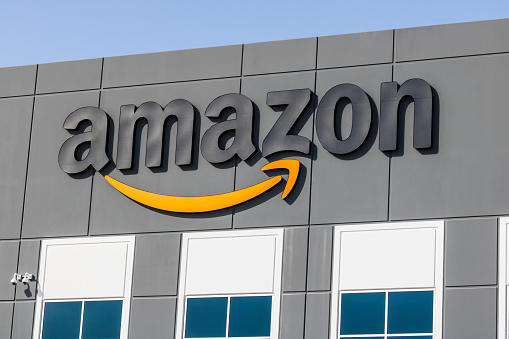When most people think of wide-spread surveillance, the government immediately comes to mind. It’s a fair association given programs like the FBI’s Counter Intelligence Program (COINTELPRO), which targeted Black activists and even Black-owned bookstores, to the present-day Countering Violent Extremism program targeting Muslim youth. However, as technology advances, private companies are getting their hands deeper and deeper into the business of surveillance.
Recently, Amazon patented “Surveillance-as-a-Service,” a technology pitched as a home security system, according to Smart Cities Dive. The patent is for a drone that can “perform a surveillance action at a property of an authorized party.” Its capabilities would include photographs, video, infrared, thermal scanning, night-vision, and audio. The patent claims that areas around the drone would be geo-fenced, so it couldn’t pick up any data. However, Amazon has often been criticized for its home devices gathering information they shouldn’t. Last month, advocacy groups claimed that Amazon’s Echo Dot kids violated children’s privacy laws by recording and storing kids’ conversations — then making it nearly impossible to delete.
Amazon’s newest patent highlights the company’s intentions to privatize surveillance, a move the tech giant has been leading up to for some time. In 2018, Amazon purchased Ring, a “smart doorbell” company whose products include a camera to send video to customers. Earlier this month, CNET found that Amazon is helping police build a surveillance network with Ring doorbells. Over the past two years, Amazon partnered with 50 police departments across the United States. Several are distributing subsidized Ring doorbells. For privacy advocates, the situation immediately rang alarm bells.
“What we have here is a perfect marriage between law enforcement and one of the world’s biggest companies creating conditions for a society that few people want to be a part of,” Mohammad Tajsar, staff attorney at the American Civil Liberties Union of Southern California, told CNET.
Surveillance has a tricky history in the United States, mainly because perpetrators don’t like to own up to it. However, mass surveillance is nothing new for Black communities, for who surveillance took early forms through slave passes, ledgers, and more. Amazon is entering into a framework developed by an anti-Black state and privatizing it. Essentially, Amazon is helping surveillance go digital, and taking a cut of the check in the process.
In may of 2018, another Amazon technology, Rekognition, was in use by police in Orlando and Oregon, according to documents obtained by the ACLU of Northern California . That same year, the Project on Government Oversight (POGO) also obtained documents that showed Amazon pitched Rekognition to US Immigration and Customs Enforcement (ICE). Amazon has sold its program — and refused to disclose a full list of buyers — despite studies that found numerous issues with Rekognition. In July 2018, the ACLU reported that Rekognition incorrectly matched 28 members of Congress to mugshots — six of which were members of the Congressional Black Caucus. Then, researchers from M.I.T. Media Lab found that Rekognition had greater errors in trying to recognize darker-skinned women.
At a House hearing where advocates requested Congress place a moratorium on facial recognition, one of the researchers, Joy Buolamwini — who is also the Founder of the Algorithmic Justice League — testified about her research.
“In one test, Amazon recognition even failed on the face of Oprah Winfrey labeling her male. Personally, I’ve had to resort to literally wearing a white mask to have my face detected by some of this technology. Coding in white face is the last thing I expected to be doing at M.I.T., an American epicenter of innovation,” Buolamwini told Congress.
The issue with Amazon’s Rekognition extends far beyond its errors with recognizing people of color (especially Black women). The technology simply shouldn’t exist because we don’t live in a society where its effects would be distributed equally. If it has the very obvious potential for mass surveillance, then it will be used to target already vulnerable communities. However, the program’s errors — and Amazon’s commitment to pretending they don’t exist — reveals the company’s dedication to earning its spot in the growing surveillance marketplace. Amazon is not concerned about social harm or it would’ve never tried to sell a facial recognition program to ICE, the same organization already responsible for the deaths of at least 24 migrants in their custody since President Trump’s administration began.
As it continues into the privatization of surveillance, Amazon is getting clever by marketing to individuals instead of the government alone. As noted by Atlantic Staff Writer Sidney Fussell, that’s part of the trick of high-tech home surveillance. Users feel empowered, but as they’re feeling that sense of empowerment, they’re also creating what Fussell described as a “regulatory gray zone.” That’s because your personal footage isn’t subject to the same rules as police surveillance. For example, home-owners can share footage online, discuss it, and essentially ensure that the surveillance network continues to grow across platforms.
Ending private surveillance in the United States is never going to be easy because surveillance as a concept is built into the core of the country. Digitizing and privatizing it is just the next logical step in a capitalistic nation and Amazon isn’t the only company profiting off of this.
Google tried to join in on the military digital complex with the Department of Defense’s Project Maven, a drone AI contract. When Google decided not to renew the contract (thanks to employee protests), it was picked up by Anduril Industries, which also designed and deployed Lattice, a “virtual border wall” that helps border agents catch people trying to cross the border. Amazon’s continued expansion of its home-surveillance network shows that there needs to be consequences for tech companies who participate in surveillance, but it won’t come from the same government who relies on it.

